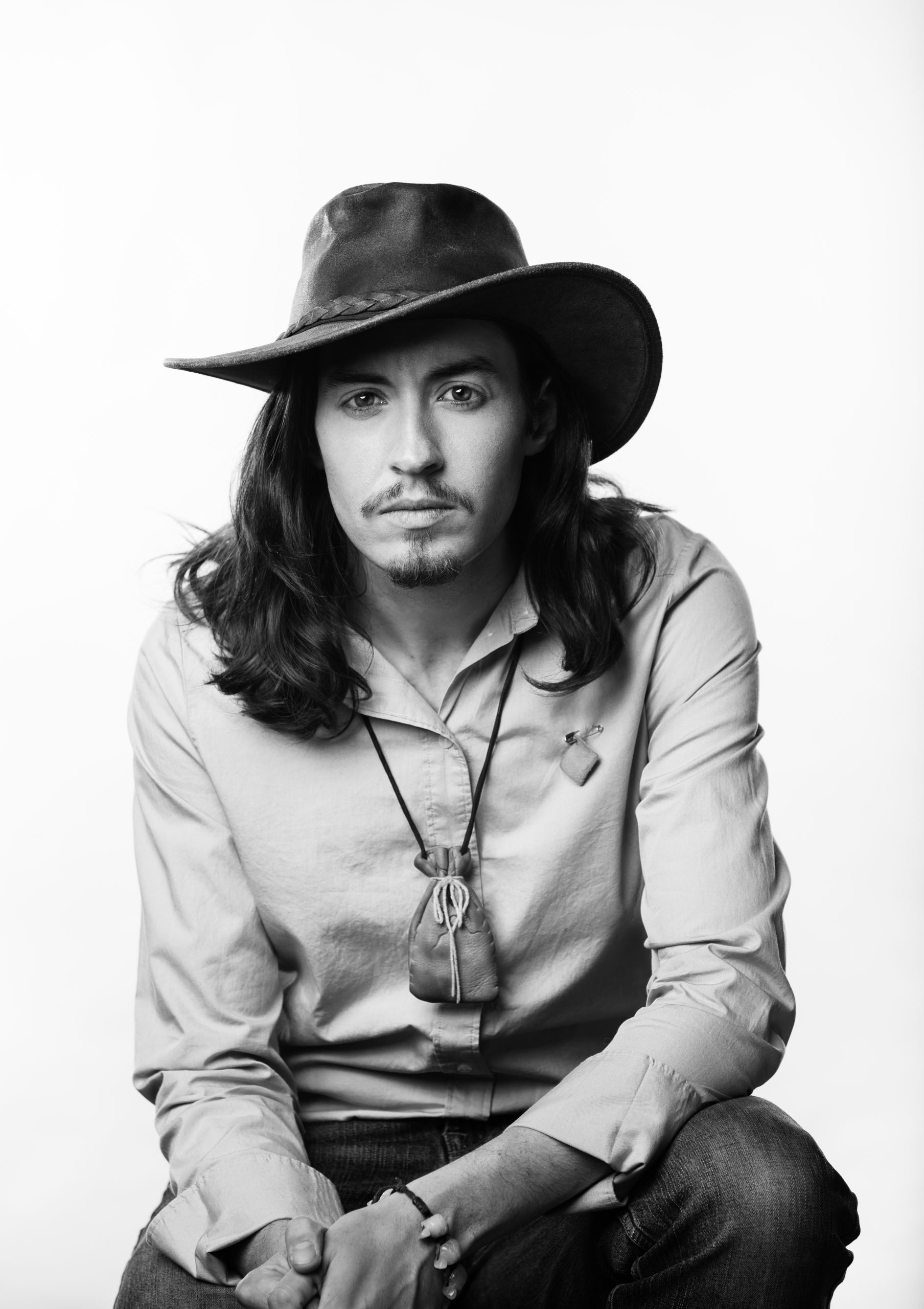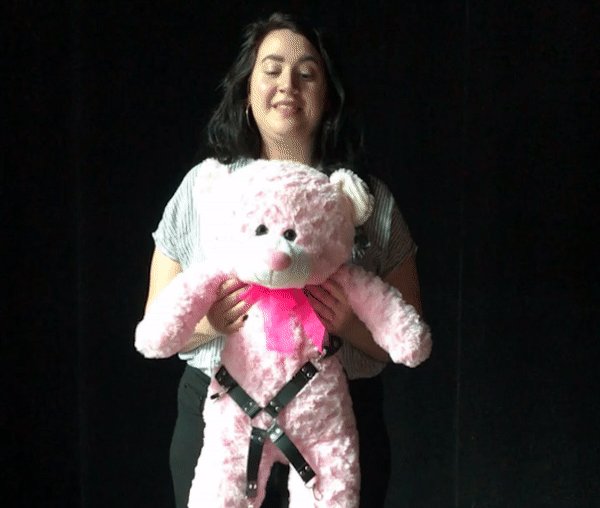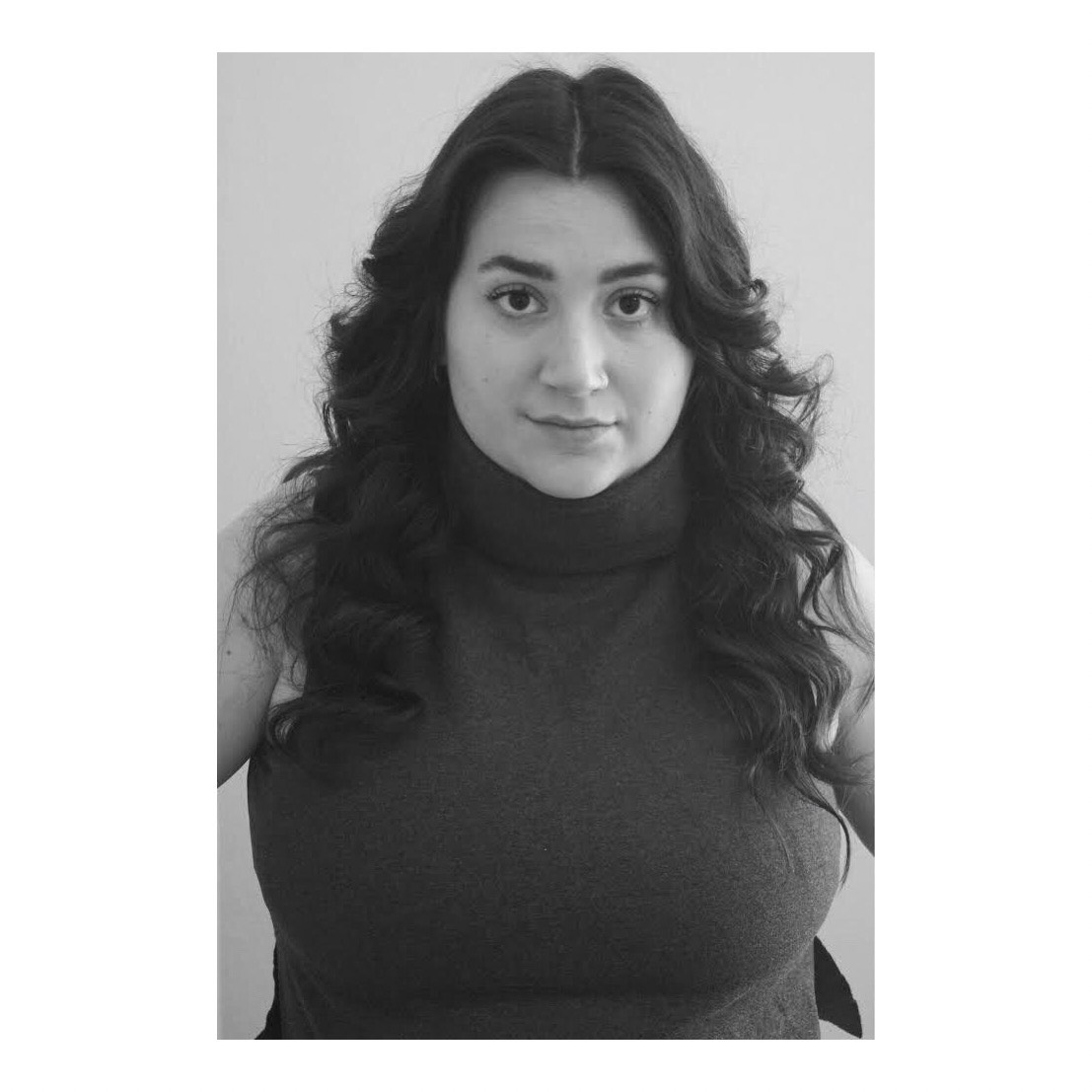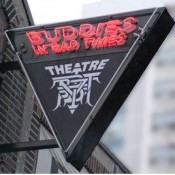A snowy January afternoon, a small group of Rhubarb artists met in the Buddies cabaret. Working in pairs, they interviewed each other on a range of topics from their artistic practices, to their obsessions and rituals. There were some moments with plush animals too. This is part III of that day, featuring Smith Purdy and Desirée Leverenz.
Read-on…

Smith Purdy is the writer of Pouin (Week One in the Chamber)
Pouin, a story (like all stories) to help guide us through an irrational world and point us toward home, Pouin delves into the urban, the rural, and a sense of unbelonging.
Can you speak about a few artists / artistic movements that you see as part of your lineage, that have shaped your thinking?
The artistic movement that I see as part of my lineage would be the Indigenous Renaissance that’s been going on in the arts and in Canadian culture over the past decade and maybe a little longer than that. When I was a kid, I would’ve been about 6 or 7 years old when the residential school closest to my home closed down, the children my age, who lived not far from me, attended a year or two of that school, Shubenacadie, and it’s kind of shocking I think for a lot of people that this history is so very recent. That generation that is growing up right now is the first generation of Indigenous folks to not have residential schools—the horror of residential schools—looming over them, and we’re the first generation who grew up seeing Buffy St. Marie on Sesame Street.
There are some really big giants of the Indigenous arts and culture movement of recent generations who finally get recognition, and cultures who finally get recognition and appreciation in the mainstream within our parents’ and grandparents’ generation. Nowadays, all of us who were born after the 70s have grown up in a world where Buffy St. Marie was always there and her music was always there. Where these heroes and these stories were always a part of our life. And so we get to take the next step from there.
I feel very very inspired by Indigenous artists, both from Turtle Island and all over the world, whether it’s Jani Lauzon working here in Toronto or Taika Waitit who is the first Indigenous filmmaker to direct a Hollywood blockbuster. I feel very inspired by this wave of powerful Indigneous artists and language activists, people like Jeremy Dutcher who are using music to bring back languages.
Not long ago, when I was growing up, people were saying that these languages are going extinct and won’t last long. When I was a kid, everyone knew the Mi’kmaq language would be going extinct within a generation. Well, today there are more Mi’kmaq language speakers than there have been at any time in the past 300 years. It’s not going extinct, it’s getting stronger and I guess I’m excited and inspired by that. I want to be a part of that to leave even more for the next generation. What artists like Buffy St. Marie and Thomas King did for me and my generation, I want to expand on that and try to move that forward.
What feels urgent to you?
The thing that feels very urgent to me right now is language. Changing our ideas about language. I want to get away from abstract, academic uses of language that confuse. I think there’s a lot of language that obfuscates the difference between the thing itself and the word that we use for the thing, the experience and the description. The signifier and the signified. I think that there is a confusion between the rules of language and the rules of nature because most of us grew up speaking the English language or French or some other noun-based European language.
We think of the world in terms of discrete objects and things, but that’s just how the language has trained us to think, that’s not necessarily how the world works. There’s a quote that I really like from the play Godspell that says, “I live in this Earth, but I don’t know what I am. I know that I am not a noun, a thing. I appear to be a verb, an integral process of the universe.” One thing that I find fascinating about Indigenous languages is that many of them are much more verb than noun based. And those languages and the stories that come from the cultures, but especially the languages in which the stories and the cultures are transmitted, carry their own understanding of the world.
I think examining that language is something that is really valuable in this time right now of identity politics. We focus so much on identity, but we don’t spend enough time talking about the experiences that relate to these identifiers, these labels that we choose for ourselves.
One thing that is very urgent right now that needs to be addressed is we look at people, especially young people in schools, as potential investments. The idea is to decide between which students are good investments or which young people are going to make good investments. That the ones that are bad investments; we shouldn’t waste our time with. We should get away from that thinking and start from the assumption that every child, every person is worth that investment. That everyone has something to say and to contribute to the whole, it’s just a matter of figuring out what that is and how we can get that out.
Desirée Leverenz is the Conceiver and the Body in Eat Me (Week One in the Cabaret)
Eat Me: A womxn indulges in her endless taste for cake and capitalism. Come hungry: it’s gonna be nasty.


What risks do you take in your performance practice?
I’m interested in the form that art can exist which informs my performance practice. My risk is my art not being able to fit anywhere. I’m at the intersection of performance art and theatre. So theatre festivals reject it, and performance art festivals reject it.
But Rhubarb just lets me do what I do. I’m taking a risk on what audiences will not take. I’m eating cake. People are uncomfortable with lips, and eating. And it’s dangerous because for the artist who doesn’t care what people think, as it’s sort of the opposite of what’s popular. By doing all this, I’m creating laneways. I’m getting audiences away from liking something specific.

What feels urgent to you? How / why?
Ursula le Guin once said, “We live in capitalism. Its power seems inescapable. So did the divine right of kings. Any human power can be resisted and changed by human beings. Resistance and change often begin in art, and very often in our art, the art of words.”
As I feel the British empire toppling, this urgency of shifting away from a capitalist patriarchal world that breeds privilege is on my mind. How is the queer community interacting with the hetero-patriarchal world? How do I benefit from that world, and what does that mean for me as an individual?
I think that it is important for the white world that we live in to learn about how others have survived and thrived for millenniums before the white world even existed. It is vital that we continue to know that there are other ways of living; and until we are all free, none of us are.

